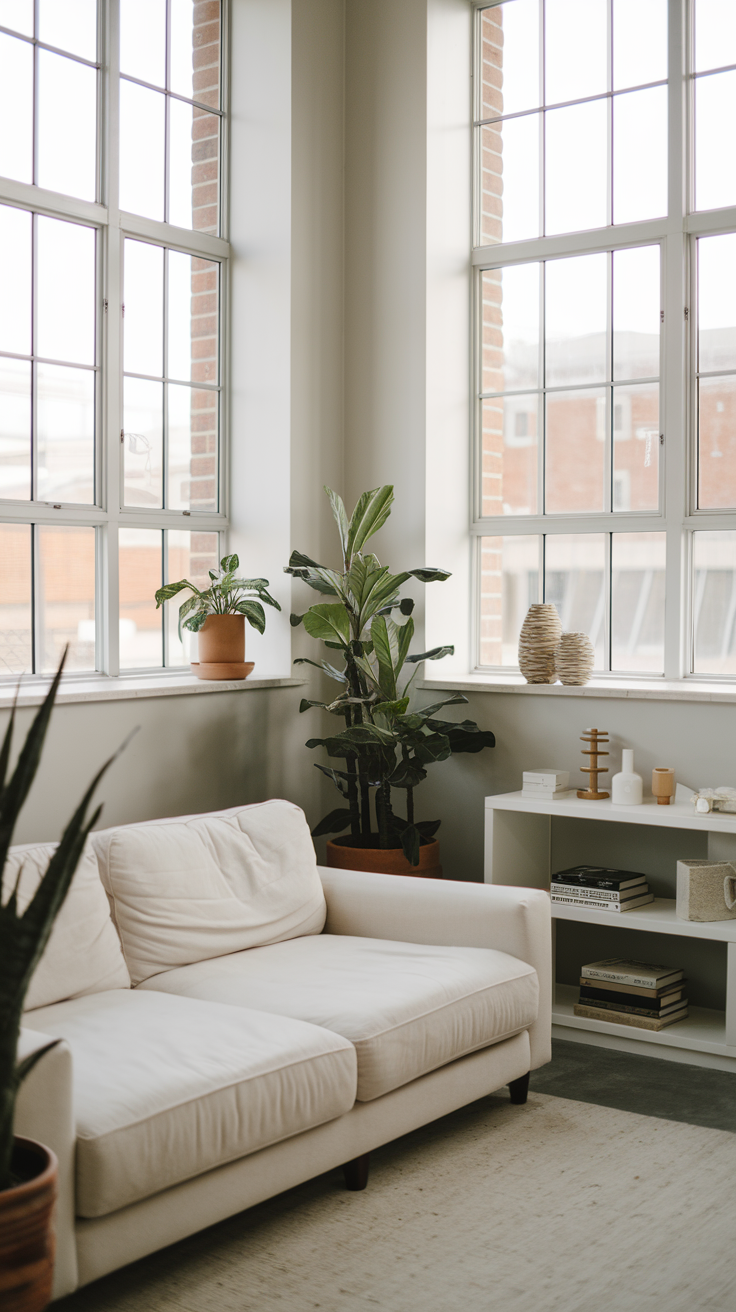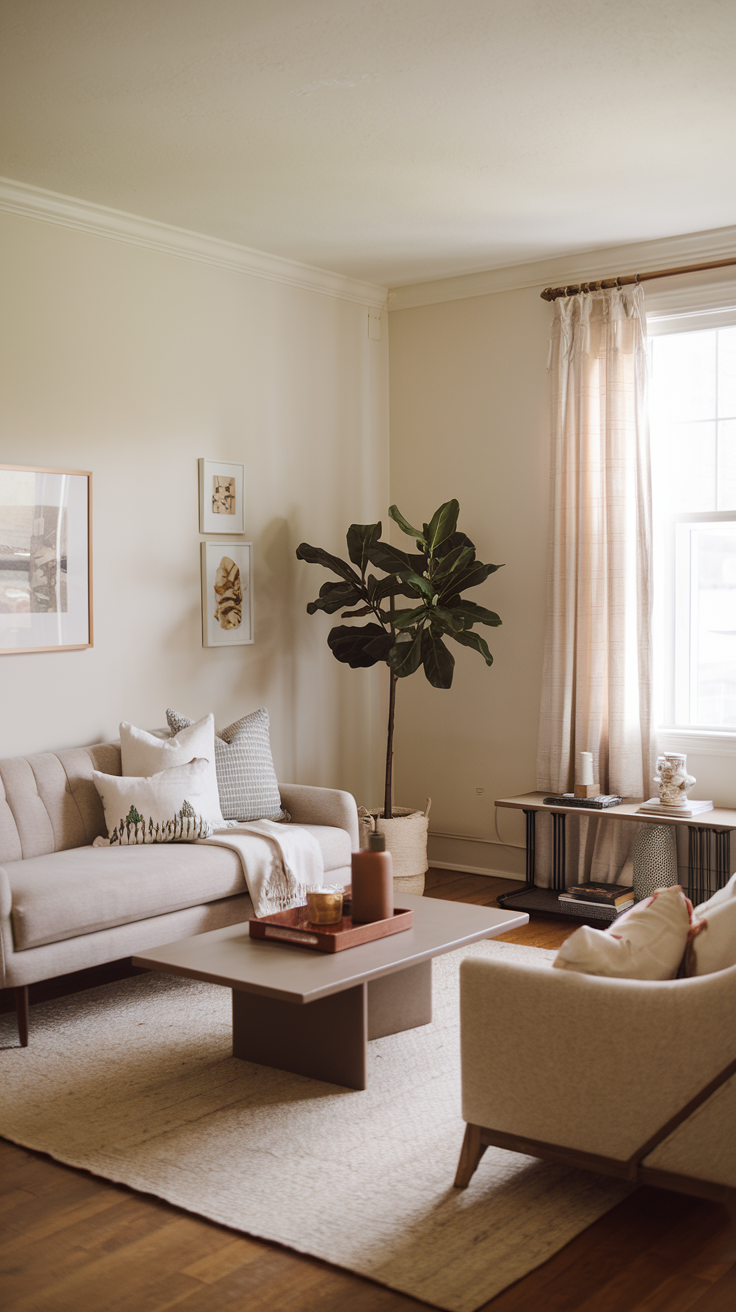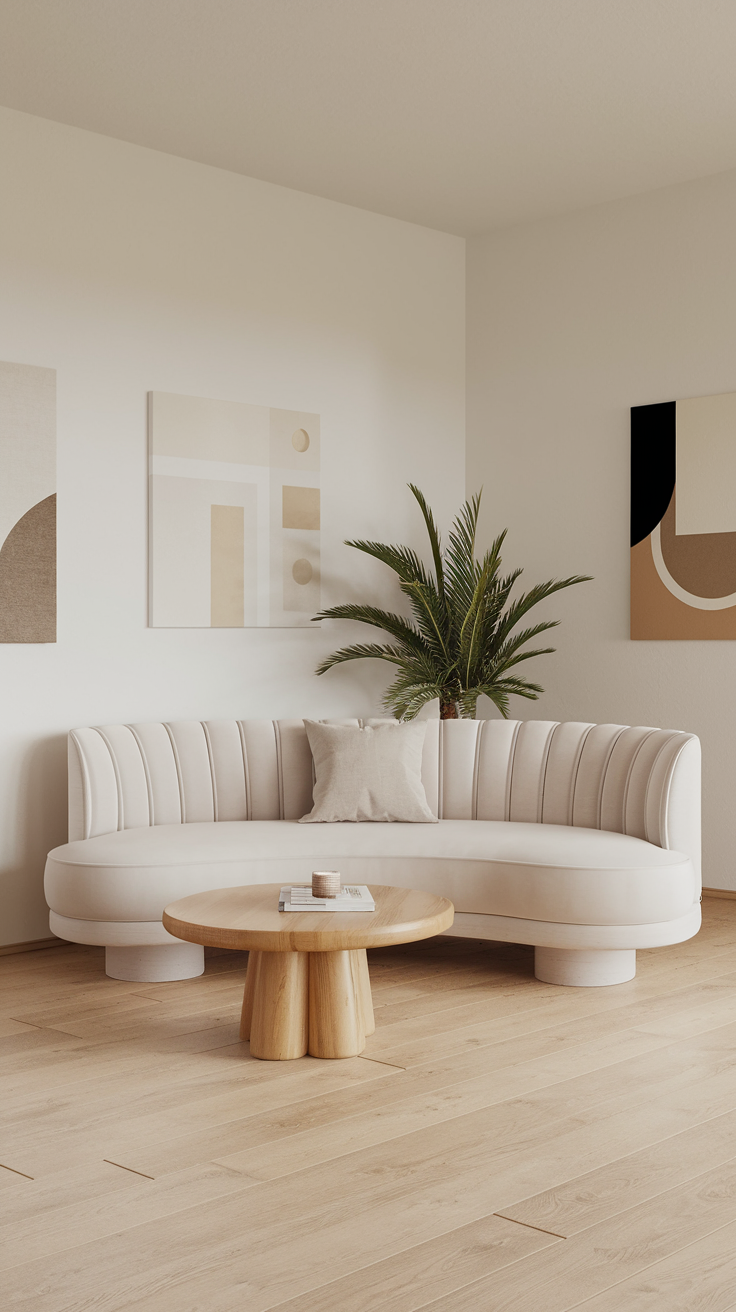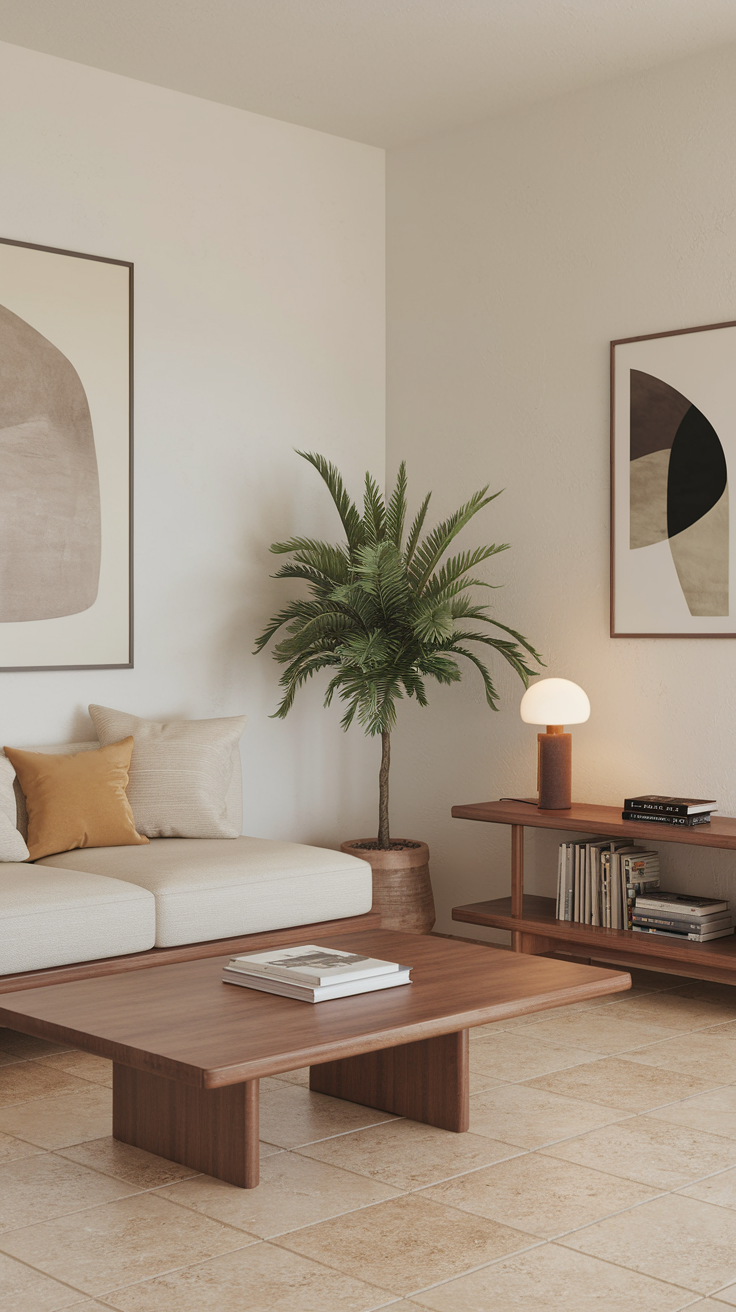13 Soft Minimalism Design Ideas for Clean, Calming Spaces
13 Soft Minimalism Design Ideas for Clean, Calming Spaces
In today’s fast-paced, cluttered world, creating a sense of calm and tranquility in your living space can be achieved through soft minimalism design. Unlike harsh or brutal minimalism, which often employs stark simplicity, soft minimalism allows for clean, uncluttered spaces while maintaining a subtle elegance and warmth. This type of design can be applied to a variety of settings, including interior design, graphic design, and architecture, to create an atmosphere of serenity and intentionality. Whether you’re redesigning your apartment interior design or seeking minimalism design ideas for a bedroom, soft minimalism emphasizes simplicity and functionality without sacrificing beauty.
1. Soft Neutral Color Palette
One of the foundational elements of soft minimalism design is the use of a neutral color palette. Soft shades of beige, white, light grey, and pastel tones allow a space to feel expansive and airy without overwhelming the senses. These subtle tones not only promote a sense of calm but also serve as a perfect backdrop for minimalism design decor and furniture.
In a minimalist bedroom design, for example, neutral walls, paired with simple white linens and a wooden bed frame, can create a tranquil retreat. Using these neutral shades in the kitchen interior design minimalism or living room will help unify the space, creating a seamless transition between different areas of your home.
| Design Element | Soft Minimalism Color Choices |
|---|---|
| Walls | Light grey, white, cream |
| Furniture | Warm wood tones, light-colored metals |
| Textiles (bedding, rugs) | Beige, off-white, light pastels |
| Accents | Subtle metallics (gold, silver) |
2. Natural Materials and Textures
Incorporating natural materials into your design is a core principle of soft minimalism. Materials such as wood, stone, and linen help create a harmonious balance between simplicity and warmth. This can be seen in minimalism design interiors where raw wood furniture or stone countertops blend seamlessly into the space.
💥🎁 Christmas & Year-End Deals On Amazon !
Don't miss out on the best discounts and top-rated products available right now!
🛒 Shop Now and Save Big Today!*As an Amazon Associate, I earn from qualifying purchases.
A minimalism design bedroom may include a linen duvet paired with a wooden bed frame and a stone accent wall. The natural textures contribute a tactile sense of comfort without cluttering the space with unnecessary adornments.
| Material | Effect |
|---|---|
| Wood | Adds warmth and organic texture |
| Stone | Creates a grounding, timeless feeling |
| Linen and Cotton | Soft, breathable, and natural feeling |
| Glass and Metals | Clean and reflective, adding elegance |
3. Strategic Furniture Placement
Soft minimalism also emphasizes the thoughtful placement of furniture to maximize both aesthetics and function. The key is to avoid overcrowding a space, opting for fewer but high-quality furniture pieces that serve both form and function. For instance, in apartment interior design minimalism, you might choose a modular sofa that doubles as a sleeping space or a multifunctional coffee table that also serves as a storage unit.
This type of approach can be seen in modern minimalist design, where clean lines and open floor plans make a small space feel more expansive and uncluttered. The result is a space that feels spacious without being barren.
| Space Type | Furniture Strategy |
|---|---|
| Living Room | Open space with one or two key furniture pieces |
| Bedroom | Minimal furniture – bed, side table, and storage |
| Kitchen | Multifunctional storage units and hidden appliances |
4. White Space and Negative Space
A significant aspect of soft minimalism design is the effective use of white space or negative space. Rather than filling every inch of a room with decor or furniture, soft minimalism embraces the beauty of emptiness, giving each element room to “breathe.” In minimalist bedroom design, this might mean leaving a significant portion of the floor unoccupied, allowing for a sense of tranquility and peace.
This principle can be translated into minimalism design posters, where clean backgrounds with ample spacing between elements provide visual clarity and focus. In minimalist interior design, this approach can make a room feel more expansive and open, promoting a calm atmosphere.
💥🎁 Christmas & Year-End Deals On Amazon !
Don't miss out on the best discounts and top-rated products available right now!
🛒 Shop Now and Save Big Today!*As an Amazon Associate, I earn from qualifying purchases.
| Design Area | White Space Application |
|---|---|
| Living Room | Wide-open areas between furniture |
| Office | Minimal decorations, lots of open space |
| Poster Design | Large margins, clear, uncluttered typography |
5. Subtle Lighting
Lighting plays a crucial role in soft minimalism, where the goal is to illuminate spaces without overwhelming them. Soft, ambient lighting through the use of floor lamps, wall sconces, or hidden LED strips helps maintain a serene atmosphere. The lighting should be warm-toned, avoiding harsh fluorescent lights or overly bright bulbs.
For instance, in minimalism design bedroom concepts, a pair of simple bedside lamps with soft bulbs creates a relaxing environment that complements the clean, minimalist aesthetic. In kitchen interior design minimalism, under-cabinet lighting can add warmth while highlighting natural materials like wood or stone.
| Lighting Style | Example Usage |
|---|---|
| Ambient Lighting | Soft wall sconces, ceiling downlights |
| Task Lighting | Simple pendant lights, hidden under-cabinet fixtures |
| Accent Lighting | LED strips, decorative floor lamps |
6. Incorporate Minimalist Art
In a soft minimalist space, artwork should be carefully curated to maintain the balance of simplicity and elegance. Minimalism design art often features clean lines, geometric shapes, or subtle monochromatic palettes. The art should serve as an accent rather than an overpowering focal point.
For example, a minimalism design poster can serve as a statement piece in a living room or hallway. The artwork might feature black and white tones or an abstract design, allowing it to integrate seamlessly with the surrounding space.
| Art Style | Effect |
|---|---|
| Minimalist Abstract | Subtle yet impactful, adding interest without cluttering |
| Monochrome Photography | Creates a sense of harmony and balance |
| Geometric Lines | Clean and modern, fitting with minimalist decor |
7. Layered Minimalism with Plants
A touch of greenery can elevate a minimalist space by adding a natural element that promotes calmness. Indoor plants in simple, neutral pots complement the clean lines and muted tones of a minimalist room. In a minimalist interior design, plants can bring a sense of life and vibrancy without overwhelming the simplicity of the space.
💥🎁 Christmas & Year-End Deals On Amazon !
Don't miss out on the best discounts and top-rated products available right now!
🛒 Shop Now and Save Big Today!*As an Amazon Associate, I earn from qualifying purchases.
For instance, minimalist cafe interior design might include a few tall potted plants in the corners, while apartment interior design minimalism could feature a small indoor garden on a windowsill. The idea is to balance the minimalistic aesthetics with the organic, calming presence of nature.
| Plant Type | Placement Idea |
|---|---|
| Tall Greenery (e.g., fiddle leaf fig) | Corner accent in living or dining rooms |
| Small Potted Plants (e.g., succulents) | On shelves or windowsills |
8. Cohesive Decor with Minimalist Details
Minimalist spaces often include decorative details that are subtle yet impactful. Rather than overloading a room with excessive ornaments, soft minimalism emphasizes the beauty of simplicity. Small minimalist decor items like ceramic vases, geometric trays, or simple candle holders can add visual interest without cluttering the space.
A minimalism design banner can also serve as a focal point in the home, providing a decorative yet understated touch that aligns with the overall aesthetic.
| Decor Type | Recommended Use |
|---|---|
| Simple Ceramic Vases | Centerpieces on coffee tables or shelves |
| Geometric Sculptures | Accent pieces on side tables or mantels |
| Soft Lighting Fixtures | Enhance ambiance with elegance |
9. Functional Yet Elegant Storage Solutions
In soft minimalism, storage is key to maintaining an uncluttered environment. The challenge lies in integrating storage solutions that are practical but don’t disrupt the overall minimalist aesthetic. Hidden storage, such as drawers built into furniture or minimalist cabinets, is ideal for maintaining the clean look of the space.
For example, in a minimalist kitchen design, pull-out drawer organizers or hidden pantry doors can streamline the space and prevent unnecessary clutter. Similarly, in a minimalist office space design, floating shelves or built-in cabinetry provide storage without overcrowding the room.
| Storage Solution | Design Benefit |
|---|---|
| Hidden Drawers | Keeps clutter out of sight |
| Floating Shelves | Adds storage without taking up floor space |
| Built-In Cabinets | Seamless integration into the room’s design |
10. Japanese-Inspired Minimalism
Inspired by Japanese minimalism design, spaces that embrace soft minimalism often feature clean lines, natural materials, and a focus on tranquility. Tatami mats, sliding doors, and neutral hues all contribute to the calming nature of Japanese-inspired interiors. Japandi style merges Scandinavian minimalism with Japanese design principles, resulting in serene, functional spaces.
💥🎁 Christmas & Year-End Deals On Amazon !
Don't miss out on the best discounts and top-rated products available right now!
🛒 Shop Now and Save Big Today!*As an Amazon Associate, I earn from qualifying purchases.
In a minimalism design bathroom, Japanese influences may include a simple soaking tub, natural wood accents, and subtle stone finishes, creating a peaceful, retreat-like atmosphere.
| Design Element | Japanese Minimalism Features |
|---|---|
| Materials | Wood, stone, rice paper |
| Space Layout | Simple, open, focused on functionality |
| Design Aesthetic | Calm, balanced, understated beauty |
11. Soft Lighting Fixtures
In minimalist spaces, the lighting fixtures themselves can be elegant and unobtrusive. Choose light fixtures that complement the soft design aesthetic with clean lines and neutral finishes. Soft lighting elements like pendant lights, simple sconces, or invisible strip lights help maintain a serene environment.
For a minimalism design living room, a couple of dimmable pendant lamps with simple lines provide both functional and aesthetic value.
| Lighting Fixture Type | Soft Minimalist Choice |
|---|---|
| Pendant Lights | Sleek, simple designs |
| Wall Sconces | Minimal, understated finishes |
| Recessed Ceiling Lights | Subtle, unobtrusive lighting option |
12. Customized Built-In Solutions
Soft minimalism places an emphasis on customization to maintain a cohesive and uncluttered environment. Built-in shelving, custom cabinetry, and integrated technology all contribute to a streamlined look. Customized designs can be used to create functional, minimal bedroom storage solutions or even built-in entertainment units for living areas.
For minimalism design interiors, customized options like hidden desks or minimalist bookshelves can provide a seamless way to organize without disrupting the aesthetics of the space.
| Custom Solution | Design Benefit |
|---|---|
| Built-In Shelving | Maximizes storage without bulk |
| Hidden Desks | Keeps workspaces neat and hidden |
| Custom Entertainment Units | Integrates seamlessly into the room |
13. Sustainable Minimalism
Finally, sustainable minimalism design emphasizes eco-friendly materials and low-waste solutions. By opting for sustainable furniture, natural fabrics, and energy-efficient lighting, you can create a space that is not only calming and minimalist but also environmentally conscious.
💥🎁 Christmas & Year-End Deals On Amazon !
Don't miss out on the best discounts and top-rated products available right now!
🛒 Shop Now and Save Big Today!*As an Amazon Associate, I earn from qualifying purchases.
Incorporating eco-friendly choices aligns with the principles of simple living minimalism and ensures that your space is both visually appealing and sustainable.
| Sustainable Element | Minimalism Design Benefit |
|---|---|
| Recycled Materials | Reduces environmental footprint |
| Energy-Efficient Lighting | Lower energy consumption, minimalist design |
| Local, Natural Products | Enhances aesthetic and supports sustainability |
Soft minimalism design allows you to craft serene, uncluttered spaces that offer both functionality and beauty. Whether you’re looking to create a minimalist living room, apartment interior design, or a minimalism design office, the ideas above showcase how simple elements, natural materials, and strategic design choices can transform any space into a calm, inviting haven.



